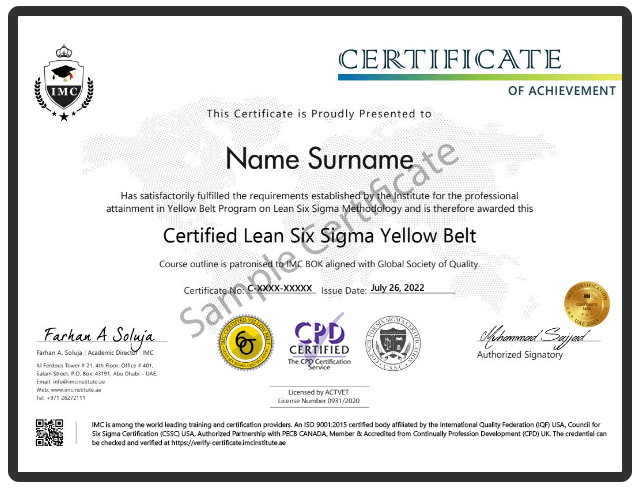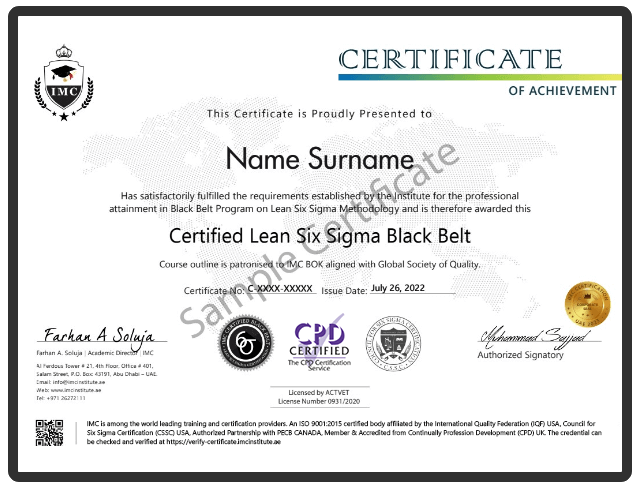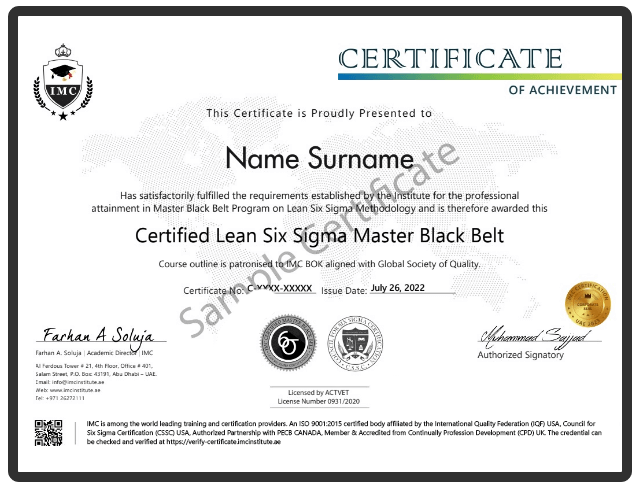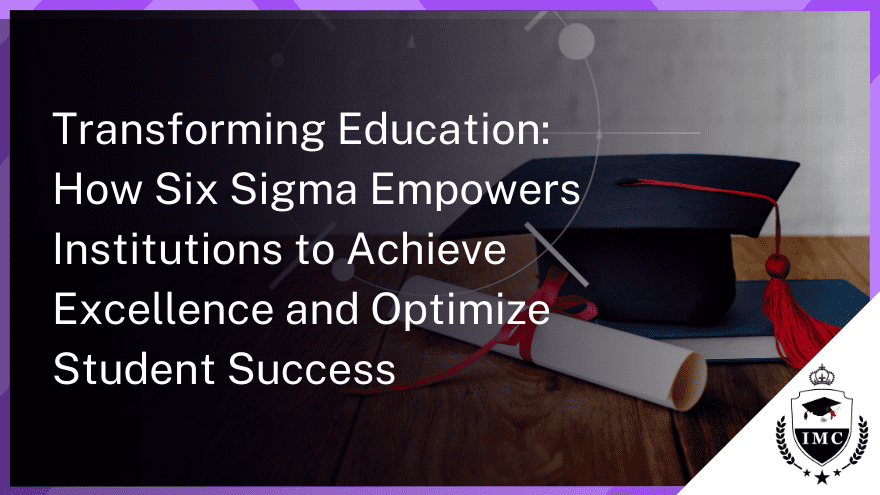In today's rapidly evolving educational landscape, institutions are constantly seeking innovative approaches to enhance quality, streamline processes, and deliver exceptional learning experiences. Six Sigma, a data-driven, disciplined methodology originally developed in the manufacturing industry, has emerged as a game-changer, transcending its roots and proving its versatility and effectiveness in driving continuous improvement across the education sector. With a deep understanding of the challenges faced by educational institutions, IMC Institute, a leading provider of Six Sigma certifications, has crafted comprehensive training programs that equip educators, administrators, and leaders with the tools and strategies necessary to foster a culture of excellence, optimize resource utilization, and ultimately, elevate student outcomes through the application of Six Sigma principles and techniques.
What is Six Sigma?
Six Sigma is a data-driven, customer-focused approach to process improvement. It utilizes a highly structured and statistically sound methodology called DMAIC (Define, Measure, Analyze, Improve, Control) to identify and eliminate defects (errors) from any process. This translates to increased efficiency, reduced waste, and ultimately, improved quality and customer satisfaction.
Why is Six Sigma relevant in Education?
While Six Sigma is often associated with manufacturing and business processes, its core principles can be remarkably effective in the education sector as well. Here's how:
Improved student learning outcomes: Six Sigma helps identify and address factors hindering student learning, such as inefficient teaching methods, ineffective assessments, or unclear communication. By streamlining processes and focusing on data-driven teaching strategies, educators can create a more optimized learning environment, leading to improved academic performance.
Enhanced student satisfaction: Six Sigma emphasizes the "Voice of the Customer" (VOC), which aligns perfectly with the focus on student satisfaction in education. By actively gathering and analyzing student feedback, institutions can identify areas for improvement and implement changes that directly address student needs and expectations, resulting in a more positive learning experience.
Increased efficiency and cost-effectiveness: Six Sigma tools can help schools and universities identify and eliminate waste in administrative processes, such as registration, admissions, or financial aid. This can lead to cost savings, allowing institutions to better allocate resources towards core educational activities.
Data-driven decision-making: Six Sigma promotes a culture of data-driven decision-making, encouraging educators to base their choices on factual evidence rather than intuition or anecdotal information. This can lead to more informed and impactful decisions regarding curriculum development, instructional methods, and resource allocation.
Continuous improvement: Six Sigma is not a one-time fix; it's a continuous improvement cycle. By regularly evaluating and refining processes, educational institutions can ensure they remain adaptable and responsive to changing needs, fostering an environment of continuous learning and growth for both students and educators.
Benefits of Six Sigma in Education:
Continuous Improvement: Six Sigma fosters a culture of continuous improvement, encouraging educators to constantly evaluate and refine their processes, teaching methodologies, and administrative procedures. This proactive approach ensures that educational institutions remain agile and responsive to the ever-changing needs of students and the broader educational landscape.
Process Optimization: By applying Six Sigma principles, institutions can identify and eliminate inefficiencies, redundancies, and non-value-adding activities within their processes. This optimization leads to cost savings, increased productivity, and a more streamlined allocation of resources, ultimately benefiting both students and educators.
Enhanced Student Performance: Six Sigma's focus on data analysis and evidence-based decision-making enables educators to gain deeper insights into student learning patterns, strengths, and areas for improvement. Armed with this knowledge, educators can tailor their teaching strategies, curriculum design, and assessments to better align with student needs, leading to improved academic performance and overall student success.
Improved Stakeholder Satisfaction: By emphasizing quality, consistency, and continuous improvement, Six Sigma helps educational institutions deliver superior services to students, parents, and other stakeholders. This heightened satisfaction can lead to increased enrollment, stronger community engagement, and a positive reputation for the institution.
Six Sigma Certification Belts:
Six Sigma Yellow Belt Certification:
The Six Sigma Yellow Belt is the next level of certification, offering a more comprehensive knowledge of Six Sigma tools and techniques. Individuals at this level can participate in process improvement projects and contribute to the implementation of Six Sigma methodologies within their respective departments or teams.
Certification
On successful completion of the course and course requisites, the candidate will receive Internationally recognized Six Sigma Yellow Belt Certification.

Six Sigma Green Belt Certification:
The Six Sigma Green Belt is a more advanced level of certification, equipping individuals with the skills to lead and facilitate small-scale improvement projects. Green Belts are proficient in using various Six Sigma tools, such as process mapping, root cause analysis, and statistical process control. They play a crucial role in identifying and eliminating defects, reducing variability, and optimizing processes within their organizations.
Certification

Six Sigma Black Belt Certification:
The Six Sigma Black Belt is the highest level of certification and is considered the expert level in Six Sigma. Black Belts have extensive knowledge and experience in implementing Six Sigma methodologies across an organization. They are equipped to lead complex improvement projects, provide training and mentorship to other belts, and drive strategic initiatives aimed at achieving operational excellence and continuous improvement.
Certification
On successful completion of the course and course requisites, the candidate will receive Internationally recognized Lean Six Sigma Black Belt Certification.

Six Sigma Master Black Belt Certification:
The Six Sigma Master Black Belt is a highly specialized and advanced level of certification. Master Black Belts are recognized as subject matter experts in Six Sigma principles and methodologies. They possess a deep understanding of advanced statistical techniques, project management skills, and the ability to guide and mentor Black Belts. Master Black Belts often take on leadership roles, developing Six Sigma strategies and driving organization-wide transformations.
Certification

On successful completion of the course and course requisites, the candidate will receive Internationally recognized Six Sigma Master Black Belt Certification.
How can IMC Institute help?
IMC Institute offers a comprehensive range of Six Sigma certifications, from foundational to advanced levels, catering to educators, administrators, and anyone seeking to improve quality and efficiency in their professional endeavors. Our expert instructors provide in-depth training, equipping individuals with the knowledge and tools necessary to successfully implement Six Sigma principles within educational institutions.
By embracing Six Sigma, educational institutions can embark on a journey of continuous improvement, ultimately leading to a higher quality of education, increased student satisfaction, and improved overall institutional effectiveness. If you're interested in learning more about how Six Sigma can benefit your educational institution, contact IMC Institute today and explore our Six Sigma certification programs.
Summary
In today's rapidly changing educational landscape, Six Sigma has emerged as a powerful methodology to drive quality and continuous improvement in educational institutions. By embracing Six Sigma certifications and adopting its principles, educators and administrators can unlock a world of opportunities for process optimization, data-driven decision-making, and enhanced student performance. The blog post highlights the benefits of implementing Six Sigma in education, including continuous improvement, process optimization, enhanced student performance, and improved stakeholder satisfaction. It emphasizes the importance of quantitative analysis, evidence-based decision-making, and the elimination of inefficiencies and waste within educational processes. IMC Institute, a leading provider of Six Sigma certifications, offers comprehensive training programs designed to equip educational professionals with the knowledge and skills necessary to implement this powerful methodology within their institutions. With expert instructors, real-world case studies, and practical applications tailored to the unique challenges faced by educational institutions, IMC Institute is at the forefront of this transformative movement. The blog post concludes by encouraging educational institutions to join this journey toward educational excellence and experience the profound impact of Six Sigma on shaping the future of learning.






